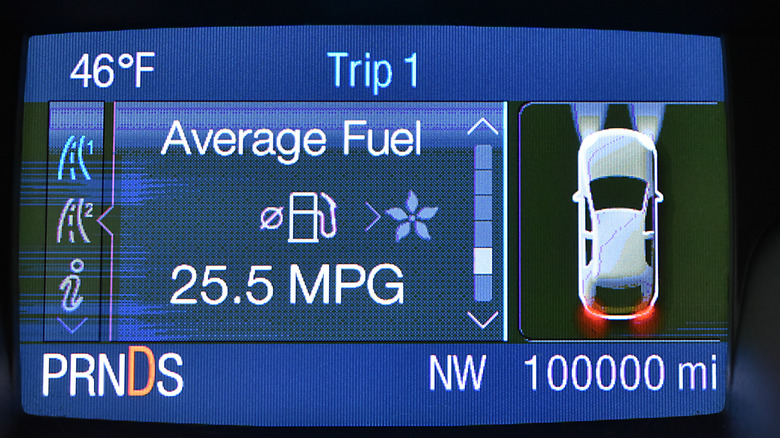The Fuel Efficiency Trick Might Actually Be Costing You More Money In The Long Run
With gas prices rising once again, everyone is doing their best to conserve fuel as they go about their daily driving routines. Many modern vehicles are equipped with a fuel saving feature that shuts off the engine momentarily when the vehicle is stopped at a red light or in traffic, so should all drivers turn off their cars when stopped at a red light to save some gasoline?
ASE certified master mechanic Mia Bevacqua noted in a column at carparts.com that there is a big difference between the way automatic fuel-saving shut-off mechanisms work, and turning your car off manually at stoplights.
"What you have to remember is that those systems instantaneously turn the engine back on when you take your foot off the brake pedal," she wrote. "You'll have to fumble around with the ignition switch and the gear selector to get the car going again, which can impede traffic and be dangerous."
She added that manually turning your car on and off frequently could also get expensive over time. "Turning the engine off at each stoplight can also cause additional wear and tear to a starting system that isn't designed for the task. As such, any minor savings you might accrue from implementing this strategy could be offset by a repair bill down the road."
The Car Talk guys agree with Bevacqua
A reader wrote to the Columbus Dispatch explaining to "Car Talk" hosts Tom and Ray Magliozzi that she and her boyfriend took frequent 150-mile round trips in her Toyota Yaris, during which he insisted on turning off the car at every stoplight. She noted that this tactic infuriated other drivers and resulted in a decrease in fuel efficiency, and asked them if shutting off the engine at stoplights was a good idea.
Tom noted that the loss in gas mileage with her boyfriend at the wheel was likely due to his driving habits. "[It's] probably because he's got a lead foot the rest of the time. He likely accelerates harder than you do, and drives faster. And that's costing you more in mileage than he's saving by shutting down the engine at stoplights."
Ray pointed out that modern vehicles that shut themselves off at traffic lights are equipped to handle frequent starts, and agreed with Bevacqua that turning off their car at every stoplight could eventually lead to a costly repair bill.
"Engineers say stop/start technology can add about five percent to fuel economy, depending on how much stop-and-go driving is done," he explained. "But the cars that come equipped with stop/start features have something your Yaris doesn't have: heavy-duty starters that are designed to make hundreds of starts a day rather than the five or 10 starts your starter typically handles."
He went on to recommend that they only turn off the engine when they will be immobile for two minutes or longer, not every time the vehicle comes to a stop.

